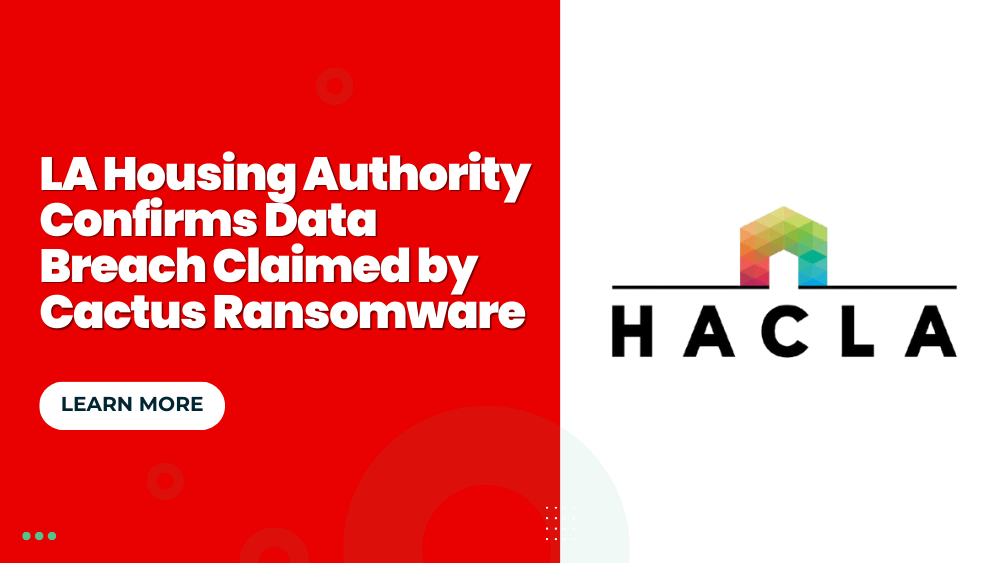A Ransomware Cyberattack Targets Los Angeles Housing Authority
The Housing Authority of the City of Los Angeles (HACLA), one of the largest public housing authorities in the United States, has confirmed a significant cyberattack on its IT network. The breach was initially claimed by the Cactus ransomware gang, a group known for its double-extortion tactics. This attack follows a previous incident two years prior involving the LockBit ransomware gang, highlighting the ongoing vulnerability of even large public organizations to sophisticated cyber threats.
HACLA, responsible for administering over 32,000 public housing units with an annual budget exceeding $1 billion, provides affordable housing and assistance programs to vulnerable populations in Los Angeles. The confirmation of the breach came via a statement to BleepingComputer: “We’ve been affected by an attack on our IT network. As soon as we became aware of this, we hired external forensic IT specialists to help us investigate and respond appropriately,” a HACLA spokesperson stated. “Our systems remain operational, we’re taking expert advice, and we remain committed to delivering important services for low-income and vulnerable people in Los Angeles.”
The Extent of the LA Housing Authority Breach and Cactus Ransomware’s Claims
While HACLA has yet to disclose the precise date of the attack’s discovery or the full extent of data compromised, the Cactus ransomware gang has claimed responsibility, asserting that they stole 891 GB of data. According to Cactus, this stolen data includes a range of sensitive information: “personal Identifiable Information, actual database backups, financial documents, executives\employees personal data, customer personal information, corporate confidential data and correspondence.” To substantiate their claims, Cactus has already published screenshots of allegedly stolen documents on their data leak site and uploaded an archive of purportedly compromised files.
Cactus Ransomware: Modus Operandi and History
Cactus ransomware first emerged in March 2023, employing a double-extortion strategy. This involves both encrypting victims’ data and threatening to publicly release stolen information unless a ransom is paid. The gang has added over 260 companies to its dark web data leak site, demonstrating its prolific activity. Their methods are multifaceted, leveraging purchased credentials, phishing attacks, and exploiting vulnerabilities in internet-exposed systems, often in partnership with other malware distributors.
Previous LA Housing Authority Breach
The current LA housing authority breach is not HACLA’s first encounter with ransomware. In March 2023, the organization disclosed a previous attack by the LockBit ransomware gang. This earlier incident, which lasted from January 15, 2022, to December 31, 2022, granted attackers access to sensitive personal information of HACLA members, including names, social security numbers, contact information, driver’s licenses, financial account numbers, and health insurance details. LockBit subsequently leaked the stolen data after HACLA refused to pay the ransom.
Implications and Future Considerations for HACLA and Public Sector Cybersecurity
The repeated targeting of HACLA underscores the serious cybersecurity challenges faced by public sector organizations. The potential impact on vulnerable individuals whose data may have been compromised is significant, raising concerns about identity theft, financial fraud, and other harms. The incident highlights the critical need for robust cybersecurity measures, including regular security assessments, employee training on phishing and social engineering tactics, and the implementation of multi-layered security defenses to protect sensitive data.
The ongoing investigation will likely reveal further details about the extent of the breach and the specific vulnerabilities exploited by Cactus ransomware. The incident serves as a stark reminder of the ever-evolving threat landscape and the importance of proactive cybersecurity strategies for organizations of all sizes, particularly those handling sensitive personal information.









